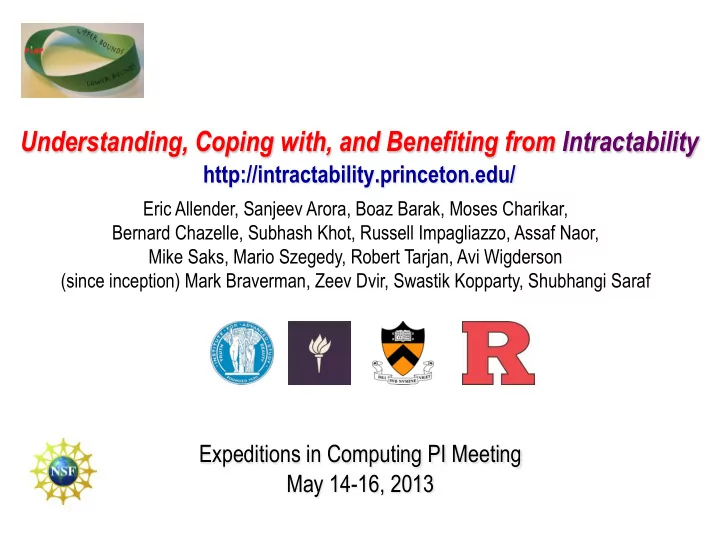

Understanding, Coping with, and Benefiting from Intractability http://intractability.princeton.edu/ Eric Allender, Sanjeev Arora, Boaz Barak, Moses Charikar, Bernard Chazelle, Subhash Khot, Russell Impagliazzo, Assaf Naor, Mike Saks, Mario Szegedy, Robert Tarjan, Avi Wigderson (since inception) Mark Braverman, Zeev Dvir, Swastik Kopparty, Shubhangi Saraf Expeditions in Computing PI Meeting May 14-16, 2013
Computational Intractability is everywhere Mathematics Computer Science X n + Y n = Z n Computation Physics Biology 2
Computational Intractability is a fundamental notion which permeates the sciences ♦ limits our ability to design better computer and communication systems ♦ limits our ability to understand natural and social systems 3
Research Goals Three frontiers of intractability: Understanding : model natural phenomena as information processes, study their resources, prove lower bounds. Coping : Find new algorithmic paradigms and techniques to circumvent intractability (approximation, heuristics, instance- based analysis, structure in practical instances) Benefiting : Using hardness to ensure privacy, secrecy, fault-tolerance; generate randomness 4
Mathematics Computer Science Statistics Pseudorandomness Machine Learning Cryptography Theoretical Theoretical Core TCS Computer Science Computer Science Coding Theory Quantum Computing Sublinear Interactive Algorithms Computation Biology Economics Physics 5
Why an Intractability Center? ♦ Solution to major open problems comes from deep and unexpected connections. ♦ mount large scale, focused attack on major problems by top TCS researchers with diverse interests and skills but common purpose. § 12 PIs (+4 -2), focused monthly meetings, constant interaction ♦ train next generation of top TCS researchers with broad expertise; disseminate knowledge to whole community. § 40+ graduate students, 30+ postdocs, 20+ workshops 6
Research Highlights ♦ Progress on major problems. ♦ New surprising connections. 7
A brief history of optimization Traveling ♦ NP-completeness (early 70’s): Salesman Many optimization problems hard to solve exactly ♦ approximately optimal solution? ♦ PCP theorem (early 90’s): optimization problems cannot be approximated beyond threshold Arora Szegedy ♦ threshold of approximability? 8
Unique Games Conjecture ♦ Systems of linear equations. ♦ How easy to satisfy? ♦ What if only 99% of equations satisfiable? ♦ [Khot] Conjecture: Hard to satisfy even 1% ♦ Far reaching implications: § captures power of convex programming for optimization problems § universal optimal algorithm 9
Significant Progress on UGC ♦ Focus area for Intractability Center ♦ Surprising new algorithm for Unique Games Steurer Arora Barak § culmination of insights (geometric, algebraic, algorithmic) from Center PIs and postdocs § insights into strength of convex programming § spectral graph partitioning 10
New Surprising Connections Social Networks Cryptography Economics Optimization 11
Social Dense Subgraph Networks Economics Cryptography Optimization ♦ Given graph, find subset with many edges 12
Social Dense Subgraph Networks Economics Cryptography Optimization ♦ Social networks : Dense subgraph = community § algorithms for instances in practice 13
Social Dense Subgraph Networks Economics Cryptography Optimization ♦ Cryptography : Dense subgraph = hidden key § new public key cryptosystem resistant to attack 14
Social Dense Subgraph Networks Economics Cryptography Optimization ♦ Economics : Dense subgraph = evidence of tampering in creation of financial derivatives § pricing derivatives computationally hard even if full information available § questions conventional economics wisdom on efficient markets § injects computational complexity into discussion 15
Social Dense Subgraph Networks Economics Cryptography Optimization ♦ Optimization : Dense subgraph = open problem § new algorithms § limitations of algorithmic techniques § hardness of approximation 16
Natural Algorithms ♦ How computing theory helps explain natural processes ♦ Learning algorithmic techniques from nature ♦ CS theory tools and techniques solve open problems in multiagent systems § bird flocking § opinion dynamics 17
Y ¡ X ¡ ♦ Interactive Communication § Extending Shannon theory to interactive communication ♦ Machine Learning § Why are machine learning approaches successful for seemingly hard problems? § structural insights lead to new, practical algorithms 18
Women in Theory ♦ Biennial workshop at Princeton (2008, 2010, 2012) ♦ 50-70 participants (grad+undergrad) ♦ technical program, career advice ♦ Tal Rabin (chair) ♦ Barak, Charikar (local organizers) 19
Women in Theory speakers Chuzhoy Tardos Zhang Dinur Dwork Malkin Chawla Goldwasser Aharonov Feigenbaum Kalai Pitassi Rashkhodnikova Lynch Singh Fleischer Moshkovitz Lysyanskaya Ramachandran King Randall Karlin Rexford Wright Tilghman Immorlica Ron Borradaile Aggarwal Klawe Saraf Rubinfeld 20
Outreach ♦ NJ Governor’s School (2009, 2010, 2011, 2012, 2013) ♦ “The Math behind the Machine” § 3 week course taught by center postdocs; guest lectures by PIs § Topics: matching, flows, markets, complexity, randomness, learning, Ryan Williams Virginia Williams Ankur Moitra Troy Lee Grant Schoenebeck (2010) (2010) (2013) (2009) (2011,2012) 21
Outreach ♦ Intensive 7-week theoretical computer science course for high-schoolers (2011, 2012, 2013) § discrete math, algorithms, proof techniques § 2011: 20 students (5 female) 2012: 31 students (9 female) 2013: 32 students (14 female), 90+ applicants ♦ guest lectures by PIs, postdocs, students ♦ biweekly meetings at Princeton through the year (2012-13) 22
Workshops 20 workshops, 50-150 participants each strong inter-disciplinary focus to foster interactions, knowledge transfer Geometry in Algorithms Oct 29-31, 2008 Impagliazzo’s Worlds June 3-5, 2009 Limits of approximation algorithms July 20-21, 2009 Barriers in Computational Complexity Aug 25-29, 2009 Natural Algorithms Nov 2-3, 2009 Decentralized Mechanism Design, Distributed Computing&Cryptography June 3-4, 2010 Pseudorandomness in Mathematics and Computer Science, June 14-18, 2010 Geometric Complexity Theory July 6-7, 2010 Barriers in Computational Complexity II August 26-30, 2010 Analysis and Geometry of Boolean Threshold Functions Oct 21-22, 2010 Approximation Algorithms – the last decade and the next June 13-17, 2011 Quantum Computing day Nov 1, 2011 Counting, Inference and Optimization on Graphs Nov 2-5, 2011 Quantum Statistical Mechanics & Quantum Computing March 22-23, 2013 Turing Centennial May 10-12, 2012 Graph and Analysis: June 4-8, 2012 Provable Bounds in Machine Learning Aug 1-2, 2012 Quantum Statistical Mechanics and Quantum Computation March 22-23, 2012 Natural Algorithms and the Sciences May 20-21, 2013 Horizons in TCS Aug 27-29, 2013 23
Mentoring: faculty placements of alumni 24
Recommend
More recommend